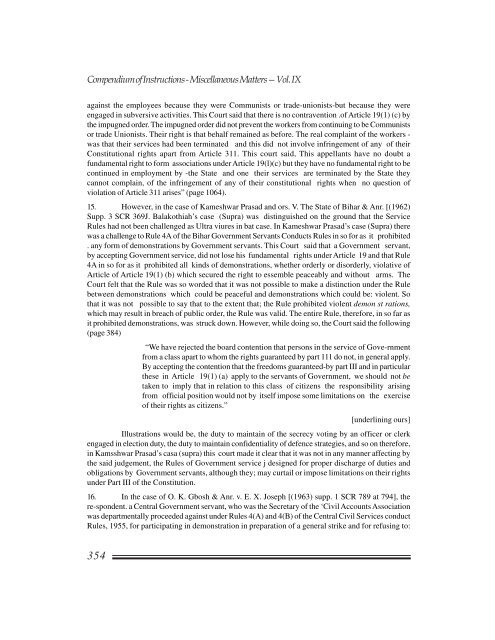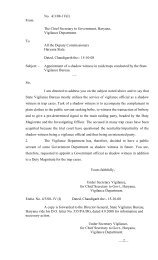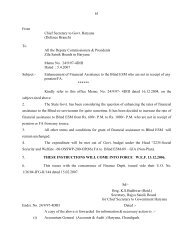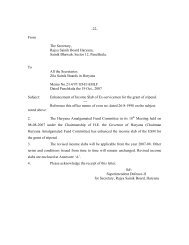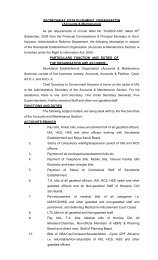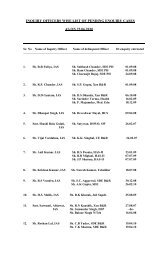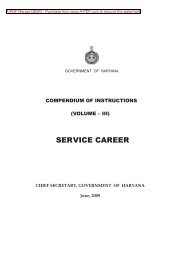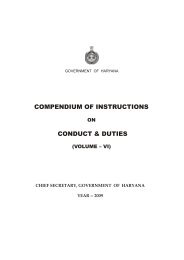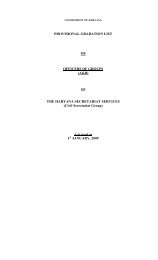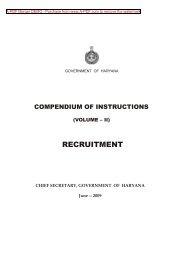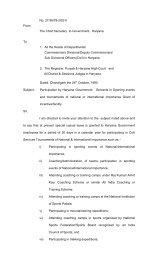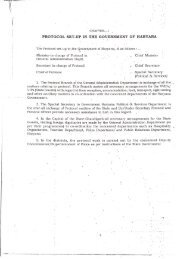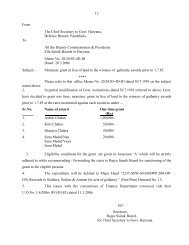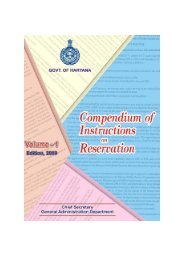- Page 1 and 2:
A-PDF Merger DEMO : Purchase from w
- Page 4 and 5:
(v) CONTENTS Sr. No and Date of Bri
- Page 6 and 7:
(vii) 1 2 3 4 CHAPTER - III OUTSOUR
- Page 8 and 9:
(ix) 1 2 3 4 53. No.G.S.R.9/Const./
- Page 10 and 11:
(xi) 1 2 3 4 81. No. 36/4/80-SGS-I,
- Page 12 and 13:
(xiii) 1 2 3 4 110. No. 62/30/95-6G
- Page 14 and 15:
(xv) 1 2 3 4 136. No. 2152-8GS-63/7
- Page 16 and 17:
(xvii) 1 2 3 4 166. 10391&4 th-,l--
- Page 18 and 19:
(xix) 1 2 3 4 191. No. 27/31/78, GS
- Page 20 and 21:
(xxi) 1 2 3 4 219. No. 12/24/90-2GS
- Page 22 and 23:
(xxiii) 1 2 3 4 246. No. 62/2/97-6G
- Page 24 and 25:
(xxv) 1 2 3 4 275. No. 62/15/2006-6
- Page 26 and 27:
(xxvii) 1 2 3 4 300. No. 31011/4/91
- Page 28 and 29:
(xxix) 1 2 3 4 CHAPTER - VIII CHANG
- Page 30 and 31:
Compendium of Instructions — Misc
- Page 32 and 33:
Compendium of Instructions — Misc
- Page 34 and 35:
Compendium of Instructions — Misc
- Page 36 and 37:
Compendium of Instructions — Misc
- Page 38 and 39:
Compendium of Instructions — Misc
- Page 40 and 41:
Compendium of Instructions — Misc
- Page 42 and 43:
Compendium of Instructions — Misc
- Page 44 and 45:
Compendium of Instructions — Misc
- Page 46 and 47:
Compendium of Instructions — Misc
- Page 48 and 49:
Compendium of Instructions — Misc
- Page 50 and 51:
Compendium of Instructions — Misc
- Page 52 and 53:
Compendium of Instructions — Misc
- Page 54 and 55:
Compendium of Instructions — Misc
- Page 56 and 57:
Compendium of Instructions — Misc
- Page 58 and 59:
II CLASSIFICATION OF POSTS
- Page 60 and 61:
Classification of Posts Copy of Pun
- Page 62 and 63:
Classification of Posts PART VI Cop
- Page 64 and 65:
Classification of Posts fo"k; %& in
- Page 66 and 67:
Classification of Posts From To No.
- Page 68 and 69:
Classification of Posts No. 31-10-7
- Page 70 and 71:
Classification of Posts i`"Bkadu Ø
- Page 72 and 73:
Classification of Posts No. 16/7/92
- Page 74 and 75:
III OUTSOURCING POLICY
- Page 76 and 77:
Outsourcing Policy No. 43/5/2001-IG
- Page 78 and 79:
Outsourcing Policy APPENDIX POLICY
- Page 80 and 81:
Outsourcing Policy for reasons of c
- Page 82 and 83:
Outsourcing Policy (c) (d) The Serv
- Page 84 and 85:
Outsourcing Policy 9. INDEMNIFICATI
- Page 86 and 87:
Outsourcing Policy 16. SERVICE OF N
- Page 88 and 89:
Outsourcing Policy 2. Signature Nam
- Page 90 and 91:
Outsourcing Policy From To No. 43/5
- Page 92 and 93:
Outsourcing Policy Government of Ha
- Page 94 and 95:
Outsourcing Policy 7. In case of th
- Page 96 and 97:
Outsourcing Policy survivor(s) of t
- Page 98 and 99:
Outsourcing Policy (b) (c) (d) iden
- Page 100 and 101:
Outsourcing Policy (d) against any
- Page 102 and 103:
Outsourcing Policy The parties can
- Page 104 and 105:
Outsourcing Policy ANNEXURE-B SERVI
- Page 106 and 107:
IV SERVICE RULES
- Page 108 and 109:
Service Rules Copy of U.O. Circular
- Page 110 and 111:
Service Rules MODEL SERVICE RULES (
- Page 112 and 113:
Service Rules (ii) by direct recrui
- Page 114 and 115:
Service Rules 13. Leave pension or
- Page 116 and 117:
Service Rules 1 2 3 4 5 6 (d) recov
- Page 118 and 119:
Service Rules eq[; lfpo] gfj;k.kk l
- Page 120 and 121:
Service Rules lsok esa 1- ,Q- lh- v
- Page 122 and 123:
Service Rules izs"kd lsok esa Øeka
- Page 124 and 125:
Service Rules Subject :— National
- Page 126 and 127:
Service Rules ANNEXURE ‘B’ HARY
- Page 128 and 129:
Service Rules fo"k; %& la;qDr iatkc
- Page 130 and 131:
Service Rules PROFORMA Position reg
- Page 132 and 133:
Service Rules (2) vgZd mEEkhnokjksa
- Page 134 and 135:
Service Rules Provided that in the
- Page 136 and 137:
Service Rules HARYANA GOVERNMENT GE
- Page 138 and 139:
Service Rules [Authorised English T
- Page 140 and 141:
Service Rules gfj;k.kk ljdkj lkekU;
- Page 142 and 143:
Service Rules Hkkx III gfj;k.kk ljd
- Page 144 and 145:
Service Rules PART I LEGISLATIVE DE
- Page 146 and 147:
Service Rules gfj;k.kk ljdkj fo/k;h
- Page 148 and 149:
Service Rules gfj;k.kk ljdkj fo/k;h
- Page 150 and 151:
Service Rules HARYANA GOVERNMENT PE
- Page 152 and 153:
Service Rules To All the Financial
- Page 154 and 155:
Service Rules A copy is forwarded f
- Page 156 and 157:
Service Rules 5. These instructions
- Page 158 and 159:
Compendium of Instructions — Misc
- Page 160 and 161:
Compendium of Instructions — Misc
- Page 162 and 163:
Compendium of Instructions — Misc
- Page 164 and 165:
Compendium of Instructions — Misc
- Page 166 and 167:
Compendium of Instructions — Misc
- Page 168 and 169:
Compendium of Instructions — Misc
- Page 170 and 171:
Compendium of Instructions — Misc
- Page 172 and 173:
Compendium of Instructions — Misc
- Page 174 and 175:
Compendium of Instructions — Misc
- Page 176 and 177:
Compendium of Instructions — Misc
- Page 178 and 179:
Compendium of Instructions — Misc
- Page 180 and 181:
Compendium of Instructions — Misc
- Page 182 and 183:
Compendium of Instructions — Misc
- Page 184 and 185:
Compendium of Instructions — Misc
- Page 186 and 187:
Compendium of Instructions — Misc
- Page 188 and 189:
Compendium of Instructions — Misc
- Page 190 and 191:
Compendium of Instructions — Misc
- Page 192 and 193:
Compendium of Instructions — Misc
- Page 194 and 195:
Compendium of Instructions — Misc
- Page 196 and 197:
Compendium of Instructions — Misc
- Page 198 and 199:
Compendium of Instructions — Misc
- Page 200 and 201:
Compendium of Instructions — Misc
- Page 202 and 203:
Compendium of Instructions — Misc
- Page 204 and 205:
Compendium of Instructions — Misc
- Page 206 and 207:
Compendium of Instructions — Misc
- Page 208 and 209:
Compendium of Instructions — Misc
- Page 210 and 211:
Compendium of Instructions — Misc
- Page 212 and 213:
Compendium of Instructions — Misc
- Page 214 and 215:
VI GENERAL INSTRUCTIONS
- Page 216 and 217:
General Instructions Copy of letter
- Page 218 and 219:
General Instructions ENCLOSURE-II F
- Page 220 and 221:
General Instructions (9) In clause
- Page 222 and 223:
General Instructions (b) 4.00 p.m.
- Page 224 and 225:
General Instructions 9. Notificatio
- Page 226 and 227:
General Instructions should, theref
- Page 228 and 229:
General Instructions Subject :- Tra
- Page 230 and 231:
General Instructions Copy of letter
- Page 232 and 233:
General Instructions Copy of Circul
- Page 234 and 235:
General Instructions Copy of Circul
- Page 236 and 237:
General Instructions Copy of letter
- Page 238 and 239:
General Instructions Copy of letter
- Page 240 and 241:
General Instructions Copy of letter
- Page 242 and 243:
General Instructions Copy of Punjab
- Page 244 and 245:
General Instructions Copy of letter
- Page 246 and 247:
General Instructions Copy of letter
- Page 248 and 249:
General Instructions No. 6054-4GS-6
- Page 250 and 251:
izs"kd lsok esa izfr Øekad 1452&2
- Page 252 and 253:
General Instructions Copy of letter
- Page 254 and 255:
General Instructions (iii) Leave ma
- Page 256 and 257:
General Instructions Copy of letter
- Page 258 and 259:
General Instructions eq[; lfpo] gfj
- Page 260 and 261:
General Instructions Copy of letter
- Page 262 and 263:
General Instructions eq[; lfpo] gfj
- Page 264 and 265:
General Instructions Copy of letter
- Page 266 and 267:
General Instructions Copy of letter
- Page 268 and 269:
General Instructions Copy of letter
- Page 270 and 271:
General Instructions MOST / IMMEDIA
- Page 272 and 273:
General Instructions Copy of letter
- Page 274 and 275:
eq[; lfpo] gfj;k.kk }kjk foHkkxkè;
- Page 276 and 277:
eq[; lfpo] gfj;k.kk }kjk foHkkxkè;
- Page 278 and 279:
eq[; lfpo] gfj;k.kk }kjk foHkkxkè;
- Page 280 and 281:
General Instructions POLICE RADIO M
- Page 282 and 283:
General Instructions eq[; lfpo] gfj
- Page 284 and 285:
General Instructions Copy of letter
- Page 286 and 287:
eq[; lfpo] gfj;k.kk }kjk foHkkxkè;
- Page 288 and 289:
General Instructions i`"Bkadu Øeka
- Page 290 and 291:
General Instructions No. 12/13/87-2
- Page 292 and 293:
General Instructions where both the
- Page 294 and 295:
General Instructions To All the Adm
- Page 296 and 297:
General Instructions From To No. 62
- Page 298 and 299:
General Instructions U.O. No. 62/31
- Page 300 and 301:
General Instructions izs"kd lsok es
- Page 302 and 303:
General Instructions From To No. 62
- Page 304 and 305:
izs"kd lsok esa Øekad 62@10@88&6 t
- Page 306 and 307:
General Instructions From To No. 12
- Page 308 and 309:
General Instructions (iii) the empl
- Page 310 and 311:
General Instructions From To No. 62
- Page 312 and 313:
General Instructions No. 28/4/84-GS
- Page 314 and 315:
General Instructions From To No. 62
- Page 316 and 317:
General Instructions From To No. 62
- Page 318 and 319:
General Instructions From To No. 18
- Page 320 and 321:
General Instructions Øekad 28@13@9
- Page 322 and 323:
General Instructions These instruct
- Page 324 and 325:
General Instructions From To No. 62
- Page 326 and 327:
General Instructions To All the Adm
- Page 328 and 329: General Instructions 3. This issue
- Page 330 and 331: izs"kd] lsok esa] Øekad 12@45@93&6
- Page 332 and 333: General Instructions IMMEDIATE Subj
- Page 334 and 335: General Instructions fo"k; %& lsok
- Page 336 and 337: General Instructions Øekad 12@44@9
- Page 338 and 339: General Instructions gks] fd, tkus
- Page 340 and 341: General Instructions ELECTION COMMI
- Page 342 and 343: General Instructions (iii) (iv) dur
- Page 344 and 345: General Instructions vU; O;fDr] rFk
- Page 346 and 347: Hkkjr fuokZpu vk;ksx General Instru
- Page 348 and 349: General Instructions 3([k) bls izkI
- Page 350 and 351: lEcfU/r ds è;ku esa yk fn, tk;sA l
- Page 352 and 353: izs"kd lsok esa Øekad 62@9@94&thñ
- Page 354 and 355: General Instructions From To No. 62
- Page 356 and 357: General Instructions Copy of letter
- Page 358 and 359: General Instructions From To No. 62
- Page 360 and 361: General Instructions U.O. No, 62/2/
- Page 362 and 363: General Instructions Copy of Office
- Page 364 and 365: izs"kd Øekad 66@80@97&7 thú,lú G
- Page 366 and 367: General Instructions Group III 1 De
- Page 368 and 369: General Instructions From No. 62/22
- Page 370 and 371: General Instructions No. 62/19/98-6
- Page 372 and 373: General Instructions In appeal, the
- Page 374 and 375: General Instructions M.H. Devendsap
- Page 376 and 377: General Instructions have to 63 rea
- Page 380 and 381: General Instructions dissociate fro
- Page 382 and 383: General Instructions a local newspa
- Page 384 and 385: General Instructions A copy of D. O
- Page 386 and 387: General Instructions 2) All the Dep
- Page 388 and 389: General Instructions From To No. 62
- Page 390 and 391: General Instructions No. 62/30/95-6
- Page 392 and 393: General Instructions 25 F of the af
- Page 394 and 395: General Instructions Endst. No. 62/
- Page 396 and 397: General Instructions ,d izfr lHkh f
- Page 398 and 399: General Instructions 5. Thirdly, it
- Page 400 and 401: General Instructions (iv) Central G
- Page 402 and 403: General Instructions From To No. 62
- Page 404 and 405: General Instructions No. 12/108/200
- Page 406 and 407: General Instructions From To Subjec
- Page 408 and 409: General Instructions From To No. 62
- Page 410 and 411: General Instructions A copy is forw
- Page 412 and 413: General Instructions Subject :- Par
- Page 414 and 415: General Instructions A copy is forw
- Page 416 and 417: General Instructions These instruct
- Page 418 and 419: General Instructions These instruct
- Page 420 and 421: Compendium of Instructions — Misc
- Page 422 and 423: Compendium of Instructions — Misc
- Page 424 and 425: Compendium of Instructions — Misc
- Page 426 and 427: Compendium of Instructions — Misc
- Page 428 and 429:
Compendium of Instructions — Misc
- Page 430 and 431:
Compendium of Instructions — Misc
- Page 432 and 433:
Compendium of Instructions — Misc
- Page 434 and 435:
Compendium of Instructions — Misc
- Page 436 and 437:
Compendium of Instructions — Misc
- Page 438 and 439:
Compendium of Instructions — Misc
- Page 440 and 441:
Compendium of Instructions — Misc
- Page 442 and 443:
Compendium of Instructions — Misc
- Page 444 and 445:
Compendium of Instructions — Misc
- Page 446 and 447:
Compendium of Instructions — Misc
- Page 448 and 449:
Compendium of Instructions — Misc
- Page 450 and 451:
Compendium of Instructions — Misc
- Page 452 and 453:
Compendium of Instructions — Misc
- Page 454 and 455:
Compendium of Instructions — Misc
- Page 456 and 457:
Compendium of Instructions — Misc
- Page 458 and 459:
Compendium of Instructions — Misc
- Page 460 and 461:
Compendium of Instructions — Misc
- Page 462 and 463:
Compendium of Instructions — Misc
- Page 464 and 465:
Compendium of Instructions — Misc
- Page 466 and 467:
Compendium of Instructions — Misc
- Page 468 and 469:
Compendium of Instructions — Misc
- Page 470 and 471:
Compendium of Instructions — Misc
- Page 472 and 473:
Compendium of Instructions — Misc
- Page 474 and 475:
Compendium of Instructions — Misc
- Page 476 and 477:
Compendium of Instructions — Misc
- Page 478 and 479:
Compendium of Instructions — Misc
- Page 480 and 481:
Compendium of Instructions — Misc
- Page 482 and 483:
Compendium of Instructions — Misc
- Page 484 and 485:
Compendium of Instructions — Misc
- Page 486 and 487:
Compendium of Instructions — Misc
- Page 488 and 489:
Compendium of Instructions — Misc
- Page 490 and 491:
Compendium of Instructions — Misc
- Page 492 and 493:
Compendium of Instructions — Misc
- Page 494 and 495:
Compendium of Instructions — Misc
- Page 496 and 497:
Compendium of Instructions — Misc
- Page 498 and 499:
Compendium of Instructions — Misc
- Page 500 and 501:
Compendium of Instructions — Misc
- Page 502 and 503:
Compendium of Instructions — Misc
- Page 504 and 505:
Compendium of Instructions — Misc
- Page 506 and 507:
Compendium of Instructions — Misc
- Page 508 and 509:
Compendium of Instructions — Misc
- Page 510 and 511:
Compendium of Instructions — Misc
- Page 512 and 513:
Compendium of Instructions — Misc
- Page 514 and 515:
Compendium of Instructions — Misc
- Page 516 and 517:
Compendium of Instructions — Misc
- Page 518 and 519:
Compendium of Instructions — Misc
- Page 520 and 521:
Compendium of Instructions — Misc
- Page 522 and 523:
Compendium of Instructions — Misc
- Page 524 and 525:
Compendium of Instructions — Misc
- Page 526 and 527:
Compendium of Instructions — Misc
- Page 528 and 529:
Compendium of Instructions — Misc
- Page 530 and 531:
Moral Turpitude IX MORAL TURPITUDE
- Page 532 and 533:
Moral Turpitude Copy of Punjab Gove
- Page 534 and 535:
Moral Turpitude 359 362 363 365 366
- Page 536 and 537:
Moral Turpitude and guidance. This
- Page 538 and 539:
Moral Turpitude 366-B Importation o
- Page 540:
Moral Turpitude 489-C Possession of


